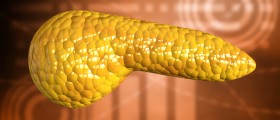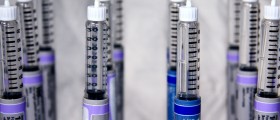
The main purpose of the pancreas is producing the hormones related to regulating carbohydrate metabolism in our body. Also, the pancreas takes care of our insulin levels, balancing them and producing insulin when necessary. Other hormones which are related to the function of the pancreas are epinephrine, thyroid hormones, glucocorticoids and human growth hormone, even though these are produced in order parts of the human body.
Additional Information about the Pancreas
The pancreas is located below the stomach, in the duodenum area, being both an endocrine and exocrine gland, the latter function being related with the digestive processes. However, the endocrine characteristics of the pancreas are production of two important hormones, insulin and glucagon. Basically, the pancreas has for hormone-producing cell types.
A cells in the pancreas are in charge of producing glucagon hormone, B cells give our body insulin, D cells are responsible for Somatostatin and F cells for producing pancreatic polypeptide. Insulin and glucagon are important for controlling carbohydrate, protein and lipid metabolisms in our body.
Facts about Insulin and Glucagon
Insulin is an anabolic hormone, expanding our body's storage of glucose, fatty acids and amino acids, present in both cells and body tissues.
As for glucagon, it is a hormone which can be classified as catabolic, gathering the substances that insulin stores and using them for specific purposes.
Somatostatin deals with other types of hormones stemming from pancreas. Also, this hormone may take the role of a neurotransmitter. Finally, pancreatic polypeptides are still a mystery of human science, even though these are thought to be involved in gastrointestinal and some other processes.
Characteristics of Insulin
Insulin is known to be a part of a larger hormone called preproinsulin. If insulin is needed in the body, its levels may increase, appearing in bursts taking place once the glucose levels in the blood are too high. Respectively, insulin production is decreased when the glucose levels are low. Furthermore, insulin affects amino acids in the body, as well as intestinal hormones, acetylcholine and many others.
When insulin is released into the body, the liver and kidneys degrade it shortly after. However, once antibodies are formed, attacking the B cells in the pancreas, diabetes occurs, due to low levels of insulin in the blood.
Insulin binds with cells through special receptors found on the membranes and the number of these receptors increases along with the amount of insulin present in the body in a given moment.
All in all, even though the main purpose of insulin is regulating glucose levels in the blood, it also serves numerous other functions in the body.

















Your thoughts on this
Loading...